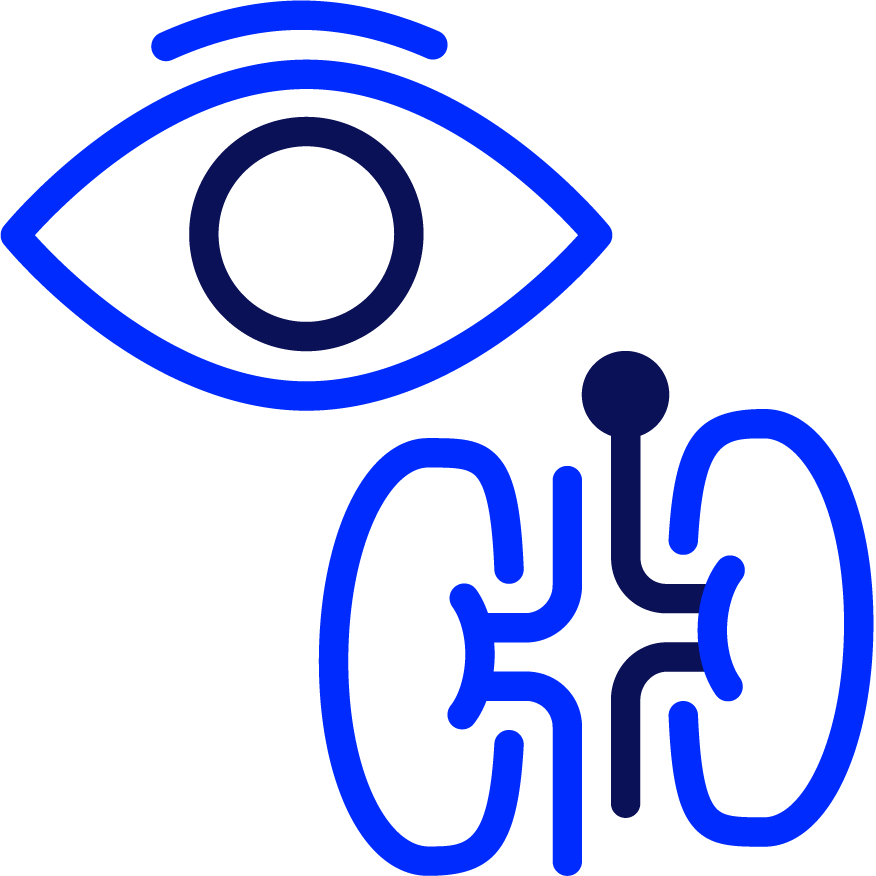Complications and mental health
Improving quality of life
Breakthrough T1D is focused on cures and also ensuring that people with type 1 diabetes (T1D) will be healthy enough to take advantage of them when they are realized. We are tackling the complications of type 1 diabetes, including eye, kidney, and heart disease—where we have the opportunity to make short- and long-term impacts on people’s lives—and the emotional burden that comes with the condition, strategically investing in developing treatments and mental health support systems that can improve outcomes for those facing T1D.
Our approach
Breakthrough T1D supports the development of drugs and behavioral health interventions that delay or prevent the progression of eye, kidney, and heart disease, and improve mental health and quality of life.
Research progress in complications and mental health
2024
Inquiry launched to address eating disorders in T1D
With Breakthrough T1D support, The Rt. Hon. Sir George Howarth MP and The Rt. Hon Theresa May MP, who served as Prime Minister of the United Kingdom from 2016 to 2019, launched a parliamentary inquiry that puts a spotlight on eating disorders in T1D and assesses the current T1D eating disorder services in the UK, with the aim of helping to prevent T1D eating disorders and support those living with these conditions.
Read More About This Research2023
An initiative to restore vision
Breakthrough T1D and the Mary Tyler Moore & S. Robert Levine, MD Charitable Foundation launch the Mary Tyler Moore Vision Initiative (MTM Vision), which has convened global research leaders to design a next-generation strategy for reversing vision loss in T1D.
Learn More About The Mary Tyler Moore Vision Initiative2021
Clinical trial aims to improve outcomes with diabetic retinopathy
Fenofibrate, a VEGV inhibitor, is an oral drug that can prevent diabetic retinopathy from getting worse. The goal of this clinical trial is to prevent progression of vision loss and restore vision already lost in diabetic retinopathy.
2020
Breakthrough T1D launches Center of Excellence at the University of Michigan
Michigan Center will study some of the most critical challenges in diabetes research, including work to identify predictive markers and therapeutic targets for T1D complications.
Learn More About The Center Of Excellence At The University Of Michigan2019
New treatment for diabetic eye disease approved
Eylea® (aflibercept) joins Lucentis® (ranibizumab) as another anti-VEGF drug approved for treating diabetic retinopathy.
Learn More About Our Diabetic Eye Disease ResearchStudy demonstrates successful new tools for improved health outcomes in children with T1D
In the pilot study Novel Interventions in Children’s Healthcare (NICH), there was a 50% reduction in diabetic ketoacidosis (DKA) and a 40% reduction in diabetes hospital visits associated with diabetes with the NICH program.
Learn More About This Pilot StudyProgram goals
Develop therapies that prevent, delay, or reverse the progressive decline of vision, kidney function, and cardiovascular health.
Establish mental health interventions that offer sustained health benefits, are scalable, and are supported by strong clinical data for broader implementation in clinical care.
Learn more about our research
Making T1D easier to manage with improved technologies, improved insulins, and other drugs—all with reduced disease distress.
Disease-modifying therapies change the course of T1D for everyone affected by it—and those yet to be—by slowing or halting the progression of the disease, preventing it from ever occurring, and reversing it entirely.
Our goal is to grow insulin-producing beta cells in a laboratory and discover a way to keep them safe inside the body without the need for chronic immunosuppression.

